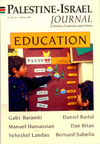This issue on Education went to print late, very late. Though the delay was caused in part by the month of Ramadan, it was mainly due to the "closure." In fact, a protracted siege was imposed on the Palestinian territories by the Israeli army (IOF), preventing part of our staff from reaching the Journal's offices in Jerusalem.
We are confident that our readers will nevertheless appreciate this issue, which tries to describe and analyze ways and means of educating new generations in Israel and Palestine. What emerges is that a wall of incomprehension and enmity still separates the children of both peoples.
How could it be otherwise? The long and bitter conflict between our two peoples is as yet unsolved. The IOF continues to control over 70 percent of Palestinian land. Though a great majority of the Palestinian population has voted for Arafat and the Palestinian Legislative Council, thus approving the peace process with Israel, a minority of extremists persist in opposing the search for peace.
Their terrorist attacks sow death among Israeli civilians and, in return, make the Israelis lash out against the peace process. Israel's harsh countermeasures - closure, demolition of houses, mass arrests and possibly deportation - inflict untold suffering and humiliation on an entire population, thus spreading more anti-Israeli feelings, which in turn strengthen those who preach hatred and terror. A similar cycle seems to be repeating itself in Lebanon, where Israel's operation Grapes of Wrath, theoretically directed against Hizbullah, inflicts deaths of Lebanese civilians, and transforms hundreds of thousands of innocent people into helpless refugees.
In the present circumstances, how can one speak of and hope for changing Israeli and Palestinian mentalities through new educational methods, aimed at tearing down the walls of enmity between the two peoples?
One can and one should. But it can only be done if each side makes a serious effort to see and understand the other's grief and pain, the other's demands and aspirations. Only thus may one expect a change in the stereotyped views one has of each other. Only thus will it become possible to remold curricula, textbooks and nursery rhymes and embark upon an education process that can eventually succeed in transforming enemies into neighbors.
In this dark hour, when so many Israelis and Palestinians are bitter and disillusioned with the peace process, one is more apt to listen to voices that seek to revive the old concepts of hostility and war. It is therefore imperative to remind ourselves that the road of armed confrontation has been tried before, to no avail for either side.
Peres and Arafat are to be commended for stating and repeating that the peace process should be continued; any other response would amount to granting victory to those who are behind the wanton killings in Jerusalem, Ashkelon and Tel Aviv. Instead of negotiation for a compromise peace between Palestinians and Israelis, this would mean a return to endless and futile battles, which in turn bring more death and sorrow.
Only by going back to the negotiating table and by accelerating the negotiations in the framework of the peace process, can we succeed in overcoming the present mood of despair and opening the way to a better future.

